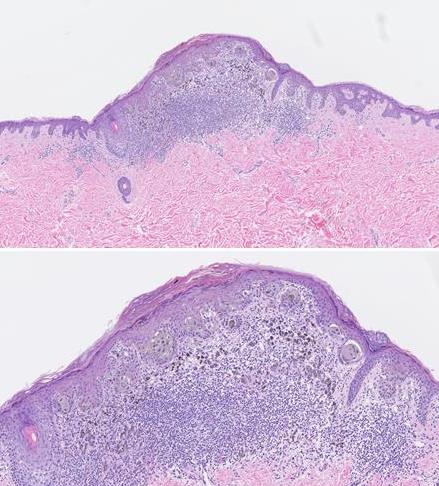24 May New Guidelines Improve Melanoma Diagnosis, But Still Room For Improvement
MedicalResearch.com Interview with:
Joann G. Elmore, MD, MPH
Professor of Medicine
David Geffen School of Medicine at UCLA
Director of the UCLA National Clinician Scholars Program
Affiliate Professor of Medicine, University of Washington School of Medicine
MedicalResearch.com: What is the background for this study? What are the main findings?
Response: In a recent study published in 2017 in the British Medical Journal, our team found that pathologists disagreed on their diagnoses of some melanocytic skin biopsy lesions and early stage invasive melanoma more than 50% of the time. This concerning level of disagreement was particularly true for diagnoses in the middle of the disease spectrum, such as atypical lesions and melanoma in situ. For example, Figure 1 from this paper shows the diagnoses of 36 pathologists who interpreted the same glass slide of a skin biopsy using their own microscopes; the diagnoses ranged from a benign lesion to invasive melanoma.
Since that study, the American Joint Committee on Cancer has released new guidelines for melanoma staging. Given this change, we wanted to examine whether the updated guidelines improved the reliability of melanoma diagnosis.
We found that using the new guidelines improved the accuracy of pathologists’ diagnoses for invasive melanoma (Elmore J, et al, JAMA Network Open 2018).

Elmore JG, Barnhill RL, Elder DE, Longton GM, Pepe MS, Reisch LM, Carney PA, Titus LJ, Nelson HD, Onega T, Tosteson ANA, Weinstock MA, Knezevich SR, Piepkorn MW. Pathologists’ diagnosis of invasive melanoma and melanocytic proliferations: observer accuracy and reproducibility study. BMJ. 2017 Jun 28;357:j2813. doi: 10.1136/bmj.j2813. Erratum in: BMJ. 2017 Aug 8;358:j3798. PubMed PMID: 28659278; PubMed Central PMCID: PMC5485913.
MedicalResearch.com: What should readers take away from your report?
Response: Even though we found that the new guidelines improved accuracy, the overall reproducibility and accuracy remain low for diagnoses of early stage melanoma. This suggests that current methods for diagnosing melanoma are still unreliable and that we may need to look beyond the human pathologist to develop new diagnostic methods.
MedicalResearch.com: What recommendations do you have for future research as a result of this work?
Response: Future research should focus on developing methods to improve diagnostic accuracy. One area I am currently studying is using computing technologies and machine learning to develop aids for pathologists to use when diagnosing difficult cases.
Disclosures: This study was supported by the National Cancer Institute of the National Institutes of Health under awards R01CA2012376, R01CA200690, and R01CA151306.
Citation:
[wysija_form id=”3″]
The information on MedicalResearch.com is provided for educational purposes only, and is in no way intended to diagnose, cure, or treat any medical or other condition. Always seek the advice of your physician or other qualified health and ask your doctor any questions you may have regarding a medical condition. In addition to all other limitations and disclaimers in this agreement, service provider and its third party providers disclaim any liability or loss in connection with the content provided on this website.
Last Updated on May 24, 2018 by Marie Benz MD FAAD
